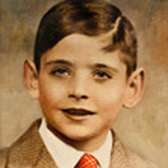
-
Learn More about Harry
- Collections View Harry's family photographs
- Echoes of Memory Read Harry's writings
- First Person Watch Harry share his Holocaust experiences at a First Person program
- Oral History Access Harry's Oral Testimony
Harry Markowicz’s first memory is of hiding in a ditch on the side of the road at age three. Following the Nazi invasion of Belgium, his family tried to flee into France. German planes machine gunned the road on which hordes of refugees were attempting to escape. Harry’s family huddled in the ditch to wait out the attack. When they reached the French border, they were turned away and forced to remain in Belgium.
Biographical Information
Harry Markowicz was born on August 9, 1937, in Berlin, Germany to Max and Marja Markowicz. His parents had emigrated from Poland shortly after World War I. Max owned a fur business, and Marja managed their Jewish household while raising Harry and his older siblings, Rosa and Manfred.
In 1938, warned by a policeman, who was a friend of the family, of an imminent outbreak of violence against Jews throughout Germany, the Markowicz family escaped to Antwerp, Belgium, shortly before Kristallnacht. Max earned money by trading in foreign currencies until Germany invaded Belgium on May 10, 1940. The Markowicz family then tried to cross the border, but since they were “stateless,” they were denied entry into France. Instead of returning to Antwerp, they rented a beach house in La Panne, Belgium. After the Belgian surrender on May 27 the Markowiczes returned to Antwerp. In 1941, the German authorities started ordering able-bodied Jewish men to work in factories or farms in Germany to replace the German workers serving in the army. Suspicious that those selected would not return, Max ignored his summons and moved the family to Brussels.
When the German authorities began relocating Jews to the East in 1942, the entire family went into hiding. Max and Marja lived in an apartment which, from the outside, appeared unoccupied. Max did not leave the apartment for two years for fear of being arrested and deported; Marja occasionally went out to visit her children who were hidden with several different families and in children’s homes in Brussels and in the Ardennes. Harry was eventually taken in by the Vanderlindens, a Belgian family with a teenage daughter, Florence. Mr. Vanderlinden delivered bread for a commercial bakery, and Mrs. Vanderlinden ran a store that sold cleaning supplies. Harry lived as part of the Vanderlinden family until the liberation of Brussels in September, 1944. Despite his youth, Harry was aware of the anxiety and fear felt by adults around him-particularly his mother-and learned to behave in ways that did not attract attention. Although hidden separately, the Markowiczes all survived the war; most of their extended family was killed.
The Markowiczes resumed their life in Brussels until 1949 when Manfred immigrated to the United States and settled in Seattle; Rosa followed shortly after. Harry and his parents joined them the following year. Harry earned a Bachelor’s Degree in French literature from the University of Washington and a Master’s Degree in Linguistics from Simon Fraser University. He pursued his doctoral studies at Georgetown University. He retired from teaching at Gallaudet University in Washington, D.C. in 2008 and was awarded the status of professor emeritus. He and his wife, Arlene Cohen, have one son, Michael. Harry is a volunteer with the United States Holocaust Memorial Museum.





